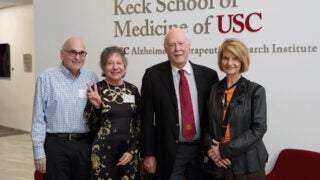Self-care among Latinos with diabetes studied
Elizabeth Pyatak seeks ways to make health an everyday habit for teens and young adults

USC occupational scientist and occupational therapist Elizabeth Pyatak helps young people with diabetes adopt the self-care habits and protocols recommended by their physicians.
In a vote of confidence, the National Institutes of Health has given the assistant professor a three-year, $450,000 grant to conduct a clinical study of a health-related lifestyle intervention targeting Los Angeles Latinos in their teens and 20s.
Set to begin this fall, the study will build upon early stage research that Pyatak conducted as a KL2 scholar in the Southern California Clinical and Translational Science Institute (SC CTSI).
A laundry list of recommendations
“Young people with diabetes often feel like they’ve been given a laundry list of recommendations, but no suggestions on how to integrate those recommendations into their everyday life,” Pyatak said. “These young people need tools to operationalize health habits.”
With help from researchers in the USC Division of Occupational Science and Occupational Therapy (OS/OT) and the SC CTSI KL2 program, Pyatak developed an intervention program that drew upon extensive literature on diabetes self-care and a preventive occupational therapy intervention developed by Florence Clark, associate dean, professor and chair in the Division of OS/OT.
The KL2 program also gave Pyatak access to Katrina Kubicek, assistant director of SC CTSI’s community engagement program, and Marisela Robles, community liaison at SC CTSI, who connected Pyatak with the American Diabetes Association in Los Angeles as well as community clinics to find research participants.
“Identifying and developing relationships with health care partners in the community is half the battle of conducting community engaged research,” Pyatak said.
Pyatak’s KL2 research suggested the lifestyle intervention may lead to improvements in medication adherence, blood glucose monitoring, depression and quality of life. The NIH grant will fund a larger, randomized clinical study with 80 participants.
“The KL2 program served as an important bridge between my Ph.D. dissertation research and my development into a clinical researcher,” Pyatak said. “It really let me look in-depth at the challenge of managing diabetes in this particular demographic.”
The KL2 project was a multidisciplinary collaboration involving OS/OT and researchers from the Keck School of Medicine of USC — including pediatric endocrinologist Marc Weigensberg and adult endocrinologist Anne Peters. Her K01 study also incorporates expertise from adolescent health researcher Donna Spruijt-Metz and a multi-institutional collaboration, including mentorship from Robin Whittemore of the Yale School of Nursing.



